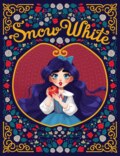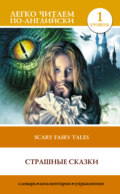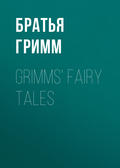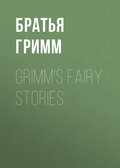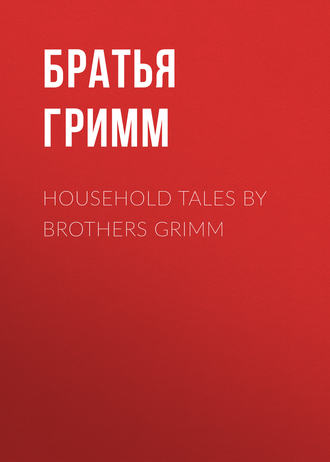
Братья Гримм
Household Tales by Brothers Grimm
198 Maid Maleen
There was once a King who had a son who asked in marriage the daughter of a mighty King; she was called Maid Maleen, and was very beautiful. As her father wished to give her to another, the prince was rejected; but as they both loved each other with all their hearts, they would not give each other up, and Maid Maleen said to her father, "I can and will take no other for my husband." Then the King flew into a passion, and ordered a dark tower to be built, into which no ray of sunlight or moonlight should enter. When it was finished, he said, "Therein shalt thou be imprisoned for seven years, and then I will come and see if thy perverse spirit is broken." Meat and drink for the seven years were carried into the tower, and then she and her waiting-woman were led into it and walled up, and thus cut off from the sky and from the earth. There they sat in the darkness, and knew not when day or night began. The King's son often went round and round the tower, and called their names, but no sound from without pierced through the thick walls. What else could they do but lament and complain? Meanwhile the time passed, and by the diminution of the food and drink they knew that the seven years were coming to an end. They thought the moment of their deliverance was come; but no stroke of the hammer was heard, no stone fell out of the wall, and it seemed to Maid Maleen that her father had forgotten her. As they only had food for a short time longer, and saw a miserable death awaiting them, Maid Maleen said, "We must try our last chance, and see if we can break through the wall." She took the bread-knife, and picked and bored at the mortar of a stone, and when she was tired, the waiting-maid took her turn. With great labour they succeeded in getting out one stone, and then a second, and a third, and when three days were over the first ray of light fell on their darkness, and at last the opening was so large that they could look out. The sky was blue, and a fresh breeze played on their faces; but how melancholy everything looked all around! Her father's castle lay in ruins, the town and the villages were, so far as could be seen, destroyed by fire, the fields far and wide laid to waste, and no human being was visible. When the opening in the wall was large enough for them to slip through, the waiting-maid sprang down first, and then Maid Maleen followed. But where were they to go? The enemy had ravaged the whole kingdom, driven away the King, and slain all the inhabitants. They wandered forth to seek another country, but nowhere did they find a shelter, or a human being to give them a mouthful of bread, and their need was so great that they were forced to appease their hunger with nettles. When, after long journeying, they came into another country, they tried to get work everywhere; but wherever they knocked they were turned away, and no one would have pity on them. At last they arrived in a large city and went to the royal palace. There also they were ordered to go away, but at last the cook said that they might stay in the kitchen and be scullions.
The son of the King in whose kingdom they were, was, however, the very man who had been betrothed to Maid Maleen. His father had chosen another bride for him, whose face was as ugly as her heart was wicked. The wedding was fixed, and the maiden had already arrived; but because of her great ugliness, however, she shut herself in her room, and allowed no one to see her, and Maid Maleen had to take her her meals from the kitchen. When the day came for the bride and the bridegroom to go to church, she was ashamed of her ugliness, and afraid that if she showed herself in the streets, she would be mocked and laughed at by the people. Then said she to Maid Maleen, "A great piece of luck has befallen thee. I have sprained my foot, and cannot well walk through the streets; thou shalt put on my wedding-clothes and take my place; a greater honour than that thou canst not have!" Maid Maleen, however, refused it, and said, "I wish for no honour which is not suitable for me." It was in vain, too, that the bride offered her gold. At last she said angrily, "If thou dost not obey me, it shall cost thee thy life. I have but to speak the word, and thy head will lie at thy feet." Then she was forced to obey, and put on the bride's magnificent clothes and all her jewels. When she entered the royal hall, every one was amazed at her great beauty, and the King said to his son, "This is the bride whom I have chosen for thee, and whom thou must lead to church." The bridegroom was astonished, and thought, "She is like my Maid Maleen, and I should believe that it was she herself, but she has long been shut up in the tower, or dead." He took her by the hand and led her to church. On the way was a nettle-plant, and she said,
"Oh, nettle-plant, Little nettle-plant, What dost thou here alone? I have known the time When I ate thee unboiled, When I ate thee unroasted."
"What art thou saying?" asked the King's son. "Nothing," she replied, "I was only thinking of Maid Maleen." He was surprised that she knew about her, but kept silence. When they came to the foot-plank into the churchyard, she said,
"Foot-bridge, do not break, I am not the true bride."
"What art thou saying there?" asked the King's son. "Nothing," she replied, "I was only thinking of Maid Maleen." "Dost thou know Maid Maleen?" "No," she answered, "how should I know her; I have only heard of her." When they came to the church-door, she said once more,
"Church-door, break not, I am not the true bride."
"What art thou saying there?" asked he. "Ah," she answered, "I was only thinking of Maid Maleen." Then he took out a precious chain, put it round her neck, and fastened the clasp. Thereupon they entered the church, and the priest joined their hands together before the altar, and married them. He led her home, but she did not speak a single word the whole way. When they got back to the royal palace, she hurried into the bride's chamber, put off the magnificent clothes and the jewels, dressed herself in her gray gown, and kept nothing but the jewel on her neck, which she had received from the bridegroom.
When the night came, and the bride was to be led into the prince's apartment, she let her veil fall over her face, that he might not observe the deception. As soon as every one had gone away, he said to her, "What didst thou say to the nettle-plant which was growing by the wayside?"
"To which nettle-plant?" asked she; "I don't talk to nettle-plants." "If thou didst not do it, then thou art not the true bride," said he. So she bethought herself, and said,
"I must go out unto my maid, Who keeps my thoughts for me."
She went out and sought Maid Maleen. "Girl, what hast thou been saying to the nettle?" "I said nothing but,
"Oh, nettle-plant, Little nettle-plant, What dost thou here alone? I have known the time When I ate thee unboiled, When I ate thee unroasted."
The bride ran back into the chamber, and said, "I know now what I said to the nettle," and she repeated the words which she had just heard. "But what didst thou say to the foot-bridge when we went over it?" asked the King's son. "To the foot-bridge?" she answered. "I don't talk to foot-bridges." "Then thou art not the true bride."
She again said,
"I must go out unto my maid, Who keeps my thoughts for me,"
And ran out and found Maid Maleen, "Girl, what didst thou say to the foot-bridge?"
"I said nothing but,
"Foot-bridge, do not break, I am not the true bride."
"That costs thee thy life!" cried the bride, but she hurried into the room, and said, "I know now what I said to the foot-bridge," and she repeated the words. "But what didst thou say to the church-door?" "To the church-door?" she replied; "I don't talk to church-doors." "Then thou art not the true bride."
She went out and found Maid Maleen, and said, "Girl, what didst thou say to the church-door?"
"I said nothing but,
"Church-door, break not, I am not the true bride."
"That will break thy neck for thee!" cried the bride, and flew into a terrible passion, but she hastened back into the room, and said, "I know now what I said to the church-door," and she repeated the words. "But where hast thou the jewel which I gave thee at the church-door?" "What jewel?" she answered; "thou didst not give me any jewel." "I myself put it round thy neck, and I myself fastened it; if thou dost not know that, thou art not the true bride." He drew the veil from her face, and when he saw her immeasurable ugliness, he sprang back terrified, and said, "How comest thou here? Who art thou?" "I am thy betrothed bride, but because I feared lest the people should mock me when they saw me out of doors, I commanded the scullery-maid to dress herself in my clothes, and to go to church instead of me." "Where is the girl?" said he; "I want to see her, go and bring her here." She went out and told the servants that the scullery-maid was an impostor, and that they must take her out into the court-yard and strike off her head. The servants laid hold of Maid Maleen and wanted to drag her out, but she screamed so loudly for help, that the King's son heard her voice, hurried out of his chamber and ordered them to set the maiden free instantly. Lights were brought, and then he saw on her neck the gold chain which he had given her at the church-door. "Thou art the true bride," said he, "who went with me to the church; come with me now to my room." When they were both alone, he said, "On the way to church thou didst name Maid Maleen, who was my betrothed bride; if I could believe it possible, I should think she was standing before me thou art like her in every respect." She answered, "I am Maid Maleen, who for thy sake was imprisoned seven years in the darkness, who suffered hunger and thirst, and has lived so long in want and poverty. To-day, however, the sun is shining on me once more. I was married to thee in the church, and I am thy lawful wife." Then they kissed each other, and were happy all the days of their lives. The false bride was rewarded for what she had done by having her head cut off.
The tower in which Maid Maleen had been imprisoned remained standing for a long time, and when the children passed by it they sang,
"Kling, klang, gloria. Who sits within this tower? A King's daughter, she sits within, A sight of her I cannot win, The wall it will not break, The stone cannot be pierced. Little Hans, with your coat so gay, Follow me, follow me, fast as you may."
199 The Boots of Buffalo-Leather
A soldier who is afraid of nothing, troubles himself about nothing. One of this kind had received his discharge, and as he had learnt no trade and could earn nothing, he travelled about and begged alms of kind people. He had an old waterproof on his back, and a pair of riding-boots of buffalo-leather which were still left to him. One day he was walking he knew not where, straight out into the open country, and at length came to a forest. He did not know where he was, but saw sitting on the trunk of a tree, which had been cut down, a man who was well dressed and wore a green shooting-coat. The soldier shook hands with him, sat down on the grass by his side, and stretched out his legs. "I see thou hast good boots on, which are well blacked," said he to the huntsman; "but if thou hadst to travel about as I have, they would not last long. Look at mine, they are of buffalo-leather, and have been worn for a long time, but in them I can go through thick and thin." After a while the soldier got up and said, "I can stay no longer, hunger drives me onwards; but, Brother Bright-boots, where does this road lead to?" "I don't know that myself," answered the huntsman, "I have lost my way in the forest." "Then thou art in the same plight as I," said the soldier; "birds of a feather flock together, let us remain together, and seek our way." The huntsman smiled a little, and they walked on further and further, until night fell. "We do not get out of the forest," said the soldier, "but there in the distance I see a light shining, which will help us to something to eat." They found a stone house, knocked at the door, and an old woman opened it. "We are looking for quarters for the night," said the soldier, "and some lining for our stomachs, for mine is as empty as an old knapsack." "You cannot stay here," answered the old woman; "this is a robber's house, and you would do wisely to get away before they come home, or you will be lost." "It won't be so bad as that," answered the soldier, "I have not had a mouthful for two days, and whether I am murdered here or die of hunger in the forest is all the same to me. I shall go in." The huntsman would not follow, but the soldier drew him in with him by the sleeve. "Come, my dear brother, we shall not come to an end so quickly as that!" The old woman had pity on them and said, "Creep in here behind the stove, and if they leave anything, I will give it to you on the sly when they are asleep." Scarcely were they in the corner before twelve robbers came bursting in, seated themselves at the table which was already laid, and vehemently demanded some food. The old woman brought in some great dishes of roast meat, and the robbers enjoyed that thoroughly. When the smell of the food ascended the nostrils of the soldier, he said to the huntsman, "I cannot hold out any longer, I shall seat myself at the table, and eat with them." "Thou wilt bring us to destruction," said the huntsman, and held him back by the arm. But the soldier began to cough loudly. When the robbers heard that, they threw away their knives and forks, leapt up, and discovered the two who were behind the stove. "Aha, gentlemen, are you in the corner?" cried they, "What are you doing here? Have you been sent as spies? Wait a while, and you shall learn how to fly on a dry bough." "But do be civil," said the soldier, "I am hungry, give me something to eat, and then you can do what you like with me." The robbers were astonished, and the captain said, "I see that thou hast no fear; well, thou shalt have some food, but after that thou must die." "We shall see," said the soldier, and seated himself at the table, and began to cut away valiantly at the roast meat. "Brother Brightboots, come and eat," cried he to the huntsman; "thou must be as hungry as I am, and cannot have better roast meat at home," but the huntsman would not eat. The robbers looked at the soldier in astonishment, and said, "The rascal uses no ceremony." After a while he said, "I have had enough food, now get me something good to drink." The captain was in the mood to humour him in this also, and called to the old woman, "Bring a bottle out of the cellar, and mind it be of the best." The soldier drew the cork out with a loud noise, and then went with the bottle to the huntsman and said, "Pay attention, brother, and thou shalt see something that will surprise thee; I am now going to drink the health of the whole clan." Then he brandished the bottle over the heads of the robbers, and cried, "Long life to you all, but with your mouths open and your right hands lifted up," and then he drank a hearty draught. Scarcely were the words said than they all sat motionless as if made of stone, and their mouths were open and their right hands stretched up in the air. The huntsman said to the soldier, "I see that thou art acquainted with tricks of another kind, but now come and let us go home." "Oho, my dear brother, but that would be marching away far too soon; we have conquered the enemy, and must first take the booty. Those men there are sitting fast, and are opening their mouths with astonishment, but they will not be allowed to move until I permit them. Come, eat and drink." The old woman had to bring another bottle of the best wine, and the soldier would not stir until he had eaten enough to last for three days. At last when day came, he said, "Now it is time to strike our tents, and that our march may be a short one, the old woman shall show us the nearest way to the town." When they had arrived there, he went to his old comrades, and said, "Out in the forest I have found a nest full of gallows' birds, come with me and we will take it." The soldier led them, and said to the huntsman, "Thou must go back again with me to see how they shake when we seize them by the feet." He placed the men round about the robbers, and then he took the bottle, drank a mouthful, brandished it above them, and cried, "Live again." Instantly they all regained the power of movement, but were thrown down and bound hand and foot with cords. Then the soldier ordered them to be thrown into a cart as if they had been so many sacks, and said, "Now drive them straight to prison." The huntsman, however, took one of the men aside and gave him another commission besides. "Brother Bright-boots," said the soldier, "we have safely routed the enemy and been well fed, now we will quietly walk behind them as if we were stragglers!" When they approached the town, the soldier saw a crowd of people pouring through the gate of the town who were raising loud cries of joy, and waving green boughs in the air. Then he saw that the entire body-guard was coming up. "What can this mean?" said he to the huntsman. "Dost thou not know?" he replied, "that the King has for a long time been absent from his kingdom, and that to-day he is returning, and every one is going to meet him." "But where is the King?" said the soldier, "I do not see him." "Here he is," answered the huntsman, "I am the King, and have announced my arrival." Then he opened his hunting-coat, and his royal garments were visible. The soldier was alarmed, and fell on his knees and begged him to forgive him for having in his ignorance treated him as an equal, and spoken to him by such a name. But the King shook hands with him, and said, "Thou art a brave soldier, and hast saved my life. Thou shalt never again be in want, I will take care of thee. And if ever thou wouldst like to eat a piece of roast meat, as good as that in the robber's house, come to the royal kitchen. But if thou wouldst drink a health, thou must first ask my permission."
200 The Golden Key
In the winter time, when deep snow lay on the ground, a poor boy was forced to go out on a sledge to fetch wood. When he had gathered it together, and packed it, he wished, as he was so frozen with cold, not to go home at once, but to light a fire and warm himself a little. So he scraped away the snow, and as he was thus clearing the ground, he found a tiny, gold key. Hereupon he thought that where the key was, the lock must be also, and dug in the ground and found an iron chest. "If the key does but fit it!" thought he; "no doubt there are precious things in that little box." He searched, but no keyhole was there. At last he discovered one, but so small that it was hardly visible. He tried it, and the key fitted it exactly. Then he turned it once round, and now we must wait until he has quite unlocked it and opened the lid, and then we shall learn what wonderful things were lying in that box.
– — – — – — – —
Children's Legends
Legend 1 St. Joseph in the Forest
There was once on a time a mother who had three daughters, the eldest of whom was rude and wicked, the second much better, although she had her faults, but the youngest was a pious, good child. The mother was, however, so strange, that it was just the eldest daughter whom she most loved, and she could not bear the youngest. On this account, she often sent the poor girl out into the great forest in order to get rid of her, for she thought she would lose herself and never come back again. But the guardian-angel which every good child has, did not forsake her, but always brought her into the right path again. Once, however, the guardian-angel behaved as if he were not there, and the child could not find her way out of the forest again. She walked on constantly until evening came, and then she saw a tiny light burning in the distance, ran up to it at once, and came to a little hut. She knocked, the door opened, and she came to a second door, where she knocked again. An old man, who had a snow-white beard and looked venerable, opened it for her; and he was no other than St. Joseph. He said quite kindly, "Come, dear child, seat thyself on my little chair by the fire, and warm thyself; I will fetch thee clear water if thou art thirsty; but here in the forest, I have nothing for thee to eat but a couple of little roots, which thou must first scrape and boil."
St. Joseph gave her the roots. The girl scraped them clean, then she brought a piece of pancake and the bread that her mother had given her to take with her; mixed all together in a pan, and cooked herself a thick soup. When it was ready, St. Joseph said, "I am so hungry; give me some of thy food." The child was quite willing, and gave him more than she kept for herself, but God's blessing was with her, so that she was satisfied. When they had eaten, St. Joseph said, "Now we will go to bed; I have, however, only one bed, lay thyself in it. I will lie on the ground on the straw." "No," answered she, "stay in your own bed, the straw is soft enough for me." St. Joseph, however, took the child in his arms, and carried her into the little bed, and there she said her prayers, and fell asleep. Next morning when she awoke, she wanted to say good morning to St. Joseph, but she did not see him. Then she got up and looked for him, but could not find him anywhere; at last she perceived, behind the door, a bag with money so heavy that she could just carry it, and on it was written that it was for the child who had slept there that night. On this she took the bag, bounded away with it, and got safely to her mother, and as she gave her mother all the money, she could not help being satisfied with her.
The next day, the second child also took a fancy to go into the forest. Her mother gave her a much larger piece of pancake and bread. It happened with her just as with the first child. In the evening she came to St. Joseph's little hut, who gave her roots for a thick soup. When it was ready, he likewise said to her, "I am so hungry, give me some of thy food." Then the child said, "You may have your share." Afterwards, when St. Joseph offered her his bed and wanted to lie on the straw, she replied, "No, lie down in the bed, there is plenty of room for both of us." St. Joseph took her in his arms and put her in the bed, and laid himself on the straw.
In the morning when the child awoke and looked for St. Joseph, he had vanished, but behind the door she found a little sack of money that was about as long as a hand, and on it was written that it was for the child who had slept there last night. So she took the little bag and ran home with it, and took it to her mother, but she secretly kept two pieces for herself.
The eldest daughter had by this time grown curious, and the next morning also insisted on going out into the forest. Her mother gave her pancakes with her – as many as she wanted, and bread and cheese as well. In the evening she found St. Joseph in his little hut, just as the two others had found him. When the soup was ready and St. Joseph said, "I am so hungry, give me some of thy food," the girl answered, "Wait until I am satisfied; then if there is anything left thou shalt have it." She ate, however, nearly the whole of it, and St. Joseph had to scrape the dish. Afterwards, the good old man offered her his bed, and wanted to lie on the straw. She took it without making any opposition, laid herself down in the little bed, and left the hard straw to the white-haired man. Next morning when she awoke, St. Joseph was not to be found, but she did not trouble herself about that. She looked behind the door for a money-bag. She fancied something was lying on the ground, but as she could not very well distinguish what it was, she stooped down, and examined it closely, but it remained hanging to her nose, and when she got up again, she saw, to her horror, that it was a second nose, which was hanging fast to her own. Then she began to scream and howl, but that did no good; she was forced to see it always on her nose, for it stretched out so far. Then she ran out and screamed without stopping till she met St. Joseph, at whose feet she fell and begged until, out of pity, he took the nose off her again, and even gave her two farthings. When she got home, her mother was standing before the door, and asked, "What hast thou had given to thee?" Then she lied and said, "A great bag of money, but I have lost it on the way." "Lost it!" cried the mother, "oh, but we will soon find it again," and took her by the hand, and wanted to seek it with her. At first she began to cry, and did not wish to go, but at last she went. On the way, however, so many lizards and snakes broke loose on both of them, that they did not know how to save themselves. At last they stung the wicked child to death, and they stung the mother in the foot, because she had not brought her up better.



